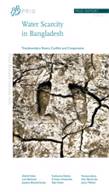
On the occasion of World Water Day 2013 (22 March), PRIO has published a new report on water scarcity and transboundary rivers in South Asia, titled Water Scarcity in Bangladesh. Transboundary Rivers, Conflict and Cooperation (PRIO Report 1/2013). In addition to reviewing bilateral agreements on water cooperation in South Asia, the report investigates water scarcity in Bangladesh and explores institutional mechanisms and strategies for basinwide and multilateral cooperation on the management of transboundary river water. View the report online or download the report as a PDF.
It is often assumed that transboundary water systems are potential sources of conflict that can exacerbate political, social, and economic tensions and cause disputes concerning the distribution, use and management of water. While some scholars conclude that water wars are inevitable, others claim that engagement over water issues can serve to build peaceful cooperation, as its necessity is taken as common ground between states. Water stress can thus be seen not only as a potential source of conflict, but as an opportunity for cooperation. Transboundary water management and governance mechanisms are important as means of preventing conflict, and facilitating and fostering water cooperation, whether they are bilateral or multilateral in scope.
The report presents the results of a collaborative and multidisciplinary effort by a team of researchers from Norway and South Asia, approaching the issue of water scarcity in Bangladesh with a view not only to conduct research on river water availability, but also to help promote awareness and knowledge-sharing on river water management in the region. The report is the outcome of the research project Water Scarcity in Bangladesh and South Asia : Dynamics of Conflict and Cooperation, led by research professor Åshild Kolås and funded by the Royal Norwegian Embassy in Dhaka.





